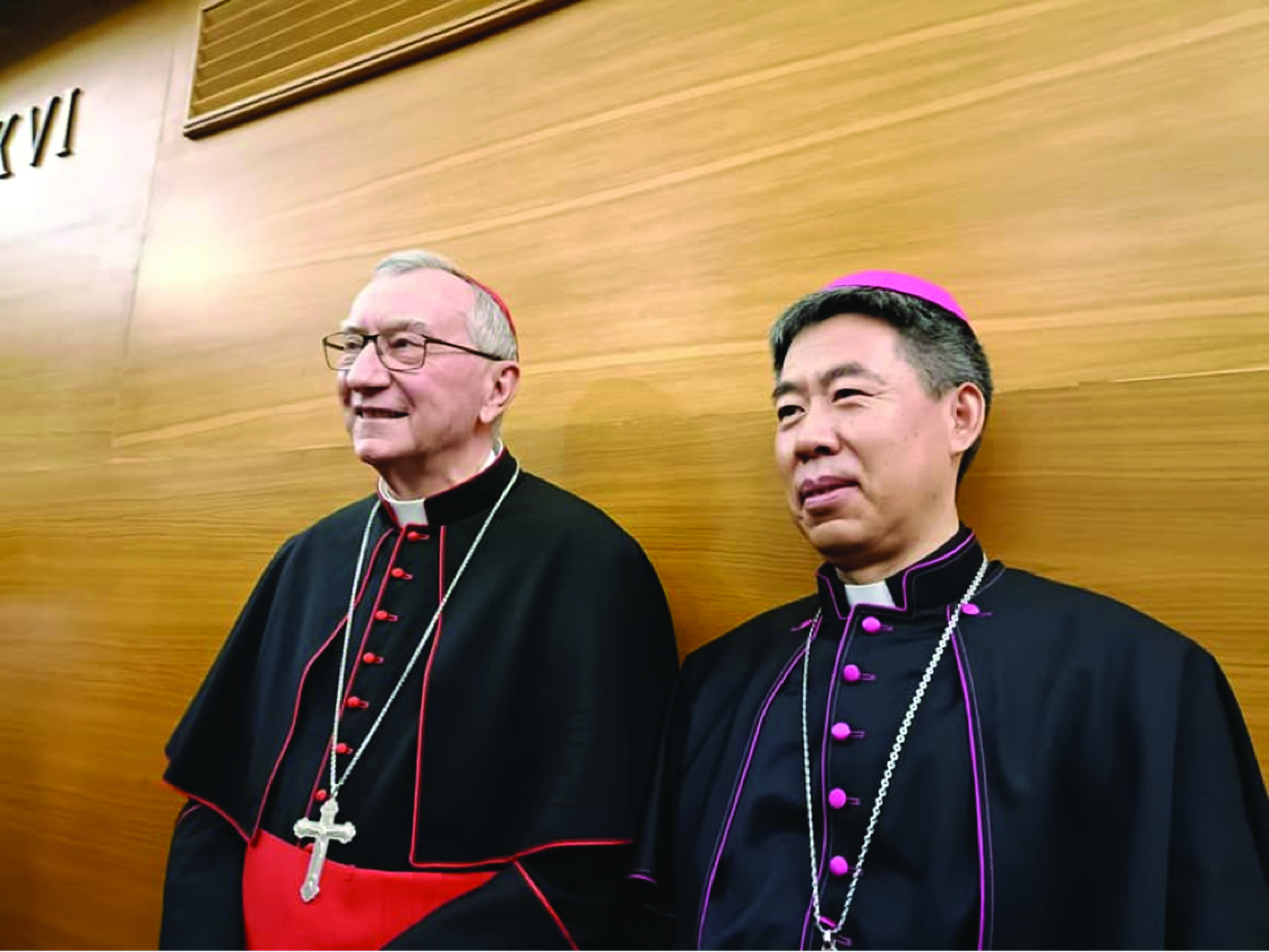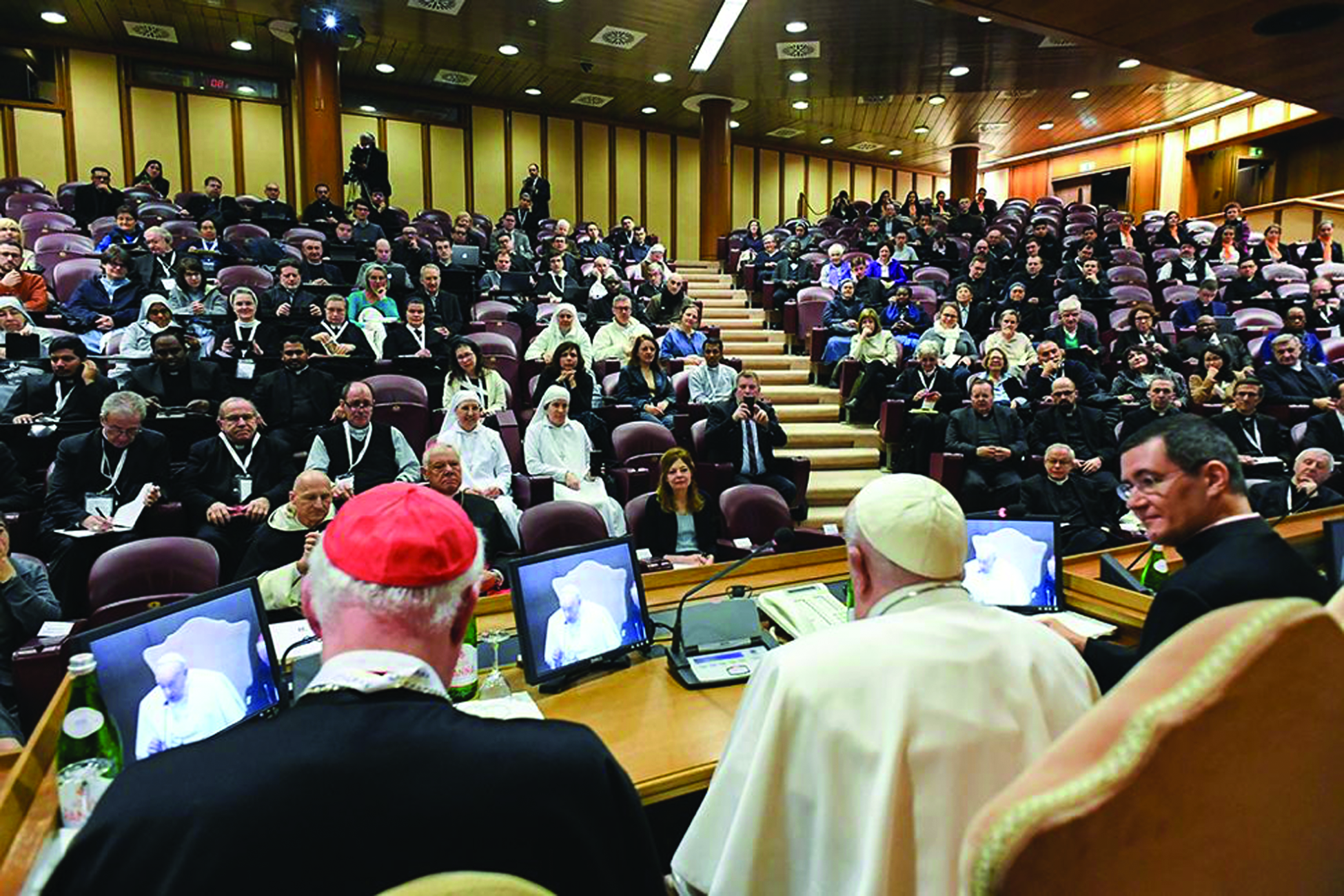On September 17, Feast of the Reception of the Stigmata by St. Francis, Archbishop Konrad Krajewski, new Papal Almoner (appointed on August 3) was consecrated a bishop in the Vatican Basilica by Cardinal Giuseppe Bertello, president of the Governatorate of Vatican City State, together with Archbishop Władysław Ziółek, the archbishop emeritus of Łódź, Poland (where Krajewski was born and raised), and Archbishop Piero Marini, president of the Pontifical Committee for International Eucharistic Congresses (who in the 1980s urged Krajewski to come to Rome). In a surprise appearance, Pope Francis, accompanied by Msgr. Guido Marini, master of papal ceremonies, also attended the event. The Holy Father, wearing only a simple stole, laid his hands on Krajewski’s head and received Holy Communion from him.
The appointment of Padre Conrado (or, for us Poles, Ksiądz Konrad) was met with great enthusiasm by people from the Borgo area (the area around Borgo Pio) where he lives in a small Vatican apartment. The new bishop is well known for his discreet daily service to the poor, especially the homeless who sleep on the streets surrounding the Vatican City walls.
Konrad Krajewski was born in Łódź in the center of Poland on November 25, 1963. He entered the diocesan seminary in 1982, at the age of 18, and was ordained a priest in 1988, at the age of 24. His appointment as one of the papal masters of ceremonies came after Pope John Paul II’s visit to Łódź in 1987, when then-Deacon Krajewski was master of ceremonies. His exemplary preparation of the event, at which 1,500 children received First Communion and at the end posed all together with the Pope at the request of John Paul, impressed the master of papal celebrations, Msgr. Piero Marini. He suggested that Konrad come to Rome to study liturgy, and he did so in 1990.
Eight years later he was invited to help the Office of Liturgical Celebrations of the Supreme Pontiff in preparations for the Jubilee Year 2000. A few months later, Father Krajewski became a regular master of papal celebrations. Thus began the Vatican period of his priestly work.
After the death of Blessed John Paul II in 2005, Krajewski began to minister to Rome’s homeless and to those seeking spiritual assistance in the Polish language. In the evenings, together with Polish Albertine Sisters (founded by St. Albert Chmielowski in Cracow, Poland) who work for the Swiss Guard, and the Polish Presentation Sisters (Congregatio Virginum a Praesentatione Beatae Mariae Virginis, founded by Blessed Zofia Czeska in Cracow, Poland), he began regularly distributing food:
“What was left at the Swiss Guard mess,” he said, “I and the nuns took and distributed to all of the homeless — and not only Poles — who were living on the streets close to the Vatican. But this was something John Paul II did every day! Whatever was left over from his kitchen, the Sacred Heart Sisters took and gave to the Vatican gendarmes and other Vatican employees. So, he prolonged his table which became ‘very long.’ Also, very often he gave what was left over to us, and we took that and gave it to the poor, not saying that it came from the papal table. We did so also during the time of Pope Benedict XVI. The Memores ladies cooking for him gave to the sisters what was ‘left over’ from the Pope’s table, and we distributed it on the streets. We did not tell anyone that what they were eating came from Benedict’s table.”
This beautiful and discreet service, known in the Vatican, was appreciated by Pope Francis, who appointed Krajewski his new Almoner, asking him to become his “hands and heart,” assuring the poor that “he thinks about them and remembers them.”
“The Holy Father wants me to go on the streets as I did for the first time on the third Sunday of September, and to help them in his name,” Krajewski said. “He said to me: These are my hands, but today they are too short. I need Konrad’s hands to lengthen mine so that I can touch all the poor in Rome. So, I have to be his hands, his heart.”
Pope Francis, in appointing Father Konrad, desires to make the office of Almoner his visible presence to the poor, starting from visits to all Roman facilities caring for the elderly. The very first such visit was at Piazza San Pietro in Vincoli next to the church by the same name (the titular church of American Cardinal Donald Wuerl, archbishop of Washington). “In the main building live 60 elderly people and 16 nuns who work with them,” Krajewski said. “The pensions these old people receive are not always enough to cover all their bills. Very often, they don’t have enough money for their needs. So, every day, two of the sisters go to nearby shops and ask for food which is only 2 or 3 days before its expiration date, or they ask vendors at the market to contribute some vegetables. Many do so with pleasure.”
He continued: “Most of these elderly are from Rome, but nobody visits them. They are very lonely, though very close to God. They can no longer expect much: neither love from their families or larger pensions. There is only God and themselves. They pray for all of us. They suffer only for the fact that nobody remembers them.
“The Holy Father wants me to go to them to say that he thinks about them and that they are in his heart. I brought to them the Holy Father’s picture from the day of his election, and I left a beautiful pearl rosary asking them to pass it every day to another room and to pray for the Holy Father. He is the first who needs our prayers. He is the first among the poor of the diocese of Rome.
“He lives in a very simple way and that’s why his heart is so beautiful. That’s why so many people want to meet him.
“So, my role will be to visit all the houses in Rome and its surroundings, three or four a week. The Holy Father clearly told me that he doesn’t want me to work mostly at a desk. I have to coordinate my job well so I can leave the office and go out on the streets to look for people in need — not an easy task.”
Once the visits are finished, Archbishop Krajewski wants to ask the Pope to celebrate Mass at St. Peter’s for all elderly Romans, administrating also the Sacrament of the Sick.
The papal almonry is an independent, self-funding office. The funds to help the poor come primarily from the fees from papal blessings issued for different occasions: Baptisms, First Communions, marriages, etc. Last year, Pope Benedict helped 6,000 people in need in Rome.
Archbishop Krajewski’s episcopal motto is Misericordia (“Mercy” in Latin). “The Holy Father appointed me to work for the poor, the elderly, people living on the street, lonely people,” he said. “To bear witness to God’s mercy in the name of the Lord and of the Holy Father. God’s Mercy is the second name of love. Jesus asks us to sacrifice for others. I have to became that mercy, sharing myself with others.”






Facebook Comments